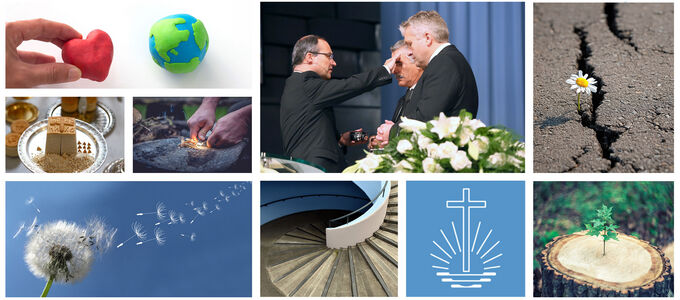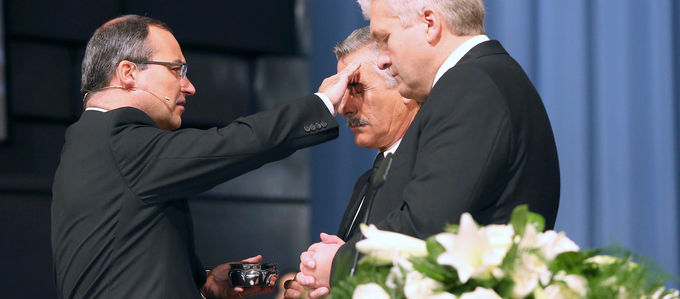
There are moments in our life of faith when heaven and earth practically touch. And these moments are so important that they have a name all to themselves: sacraments. What are these? Where do they originate? What do they accomplish? — Introducing a brand new series.
When a bride and bridegroom give rings to one another, they are more than mere symbols. They constitute a promise—and their love is thus visibly revealed. — When a mother prepares a meal for her child, it is more than merely a meal. It is a practical manifestation of her loving care. And once again, love is visibly revealed.
It is quite similar when it comes to God’s love for mankind.
How God reveals Himself
God reveals His nature in the most diverse ways. First and foremost, this includes the natural creation. This is something that everyone can see, even though not everyone recognises or acknowledges the Creator in it.
He also reveals His will in the history of mankind, for example, through His messengers and prophets to the people of Israel—but more than ever before, in the incarnation of His Son for the whole world. Holy Scripture attests of this in both the Old and the New Testaments.
And finally, God also encounters man directly—ever since the outpouring of the Holy Spirit on Pentecost—in the church of Christ. His will is revealed in the preaching of the gospel. And His nature can be recognised in the sacraments: it is in these holy acts that the love of God becomes visible.
How the churches count them
But then comes the question of what sacraments even exist in the first place. The Catholic Church—together with the Orthodox churches—acknowledges seven of them. The Protestant churches counts only two, while the New Apostolic Church, on the other hand, recognises three. And many of the free churches do without the concept entirely, considering the sacraments to be nothing more than symbolic acts.
Where do these distinctions originate? And what is the reason for them? A new nac.today series will provide answers to these and many more questions over the coming months. And there will be some surprises along the way.
Foundations in the Bible
Before we go any further: the word ‘sacrament’ cannot even be found in the Bible. Only the Greek term ‘mysterion’—which translates into Latin as ‘sacramentum’ —can be found there. But in the early period of the church, these “mysteries” had nothing to do with any sort of acts.
It was only in the course of early church history that this Latin word for “oath” eventually began to denote a visible indication of an invisible reality of divine salvation. And the story takes yet another drastic turn with the Reformation.
Nevertheless, these fundamental acts do have a good biblical basis. This is something the series covers in detail for the three sacraments of the New Apostolic Creed: Holy Baptism, Holy Communion, and Holy Sealing. And the series also explains the elements of salvation that are revealed in the respective holy acts, as well as the effect each one has upon a human being.
How forms evolve
The churches have found a great deal of leeway when it comes to the forms these signs of salvation take: while some merely wet the forehead of the baptised with water, others insist the baptised be fully immersed in water. While some also baptise children, others only allow adults to be baptised.
And as concerns the Lord’s Supper, the elements allow for even more possible variations: sourdough or unleavened bread? Red wine or white wine? Or perhaps a combination of both elements in the form of a wafer sprinkled with wine.
None of this happens without a reason. As readers become acquainted with all of these aspects, the new series becomes a journey of discovery through the various signs of God’s love.
Photo: christianchan – stock.adobe.com













